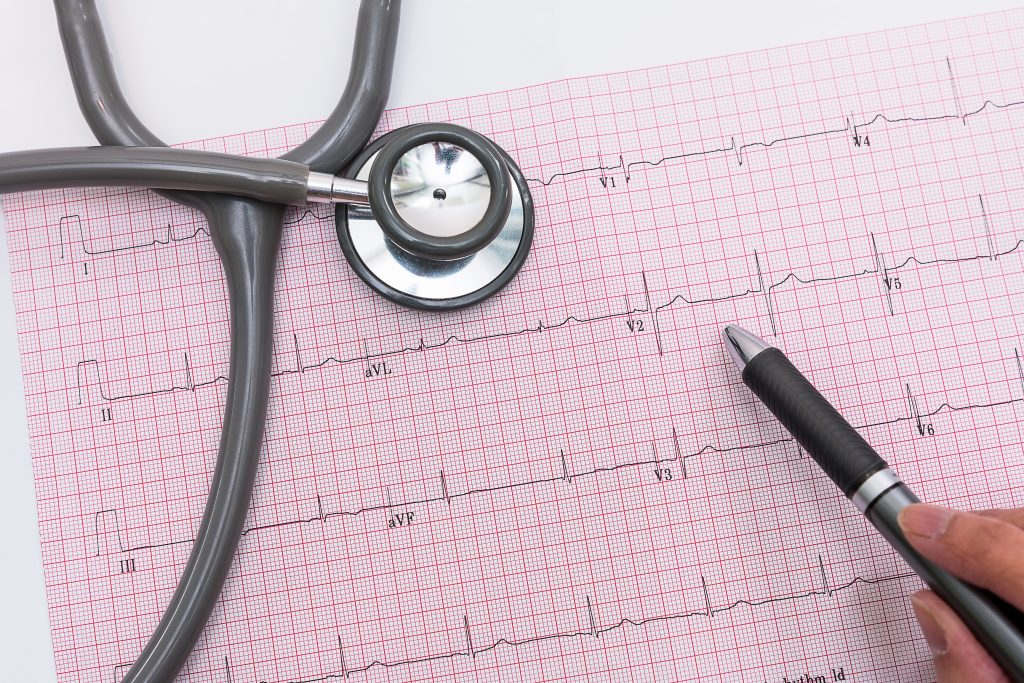
One or more diagnostic testing methods may be used to determine if a person has cardiovascular disease, the type of disease, the severity, and the most effective treatment methods.
A stress echocardiogram, or stress echo, is one type of cardiovascular diagnostic test that can help provide important insights about the heart and blood vessels.
What is Stress Echocardiography?
An echocardiogram is a non-invasive, painless, test that uses high-frequency sound waves (ultrasound) to examine the heart’s anatomy and function.
A stress test evaluates your heart’s response to physical activity through the monitoring of your heart rate, blood pressure, and electrocardiograms while you exercise on a treadmill or undergo medication-induced stress.
When the two tests are combined, an assessment can be made of the status of your heart at rest, as well as during and immediately following stress. This can provide your doctor with information regarding whether or not you have significant blockages in your heart arteries. Other information obtained includes an assessment of the pumping function of your heart and the status of your heart valves.
When is Stress Echocardiography Used?
To evaluate your heart rate, breathing, blood pressure, and how tired you become when exercising, your provider will likely order a stress echocardiogram.
Stress echocardiograms are also used to help:
- Diagnose coronary artery disease (CAD)
- Diagnose the possible cause of symptoms such as chest pain (angina)
- Determine your safe level of exercise
- Predict dangerous heart-related conditions such as heart attack
- Determine if your current cardiac rehabilitation plan is effective
Preparing for a Stress Echocardiogram
No special preparations are necessary, however, you should not eat, drink, or smoke four hours prior to your appointment (except for water). Additionally, your last meal before your test should not include caffeine or alcohol.
Your doctor may also ask you to stop taking certain heart medications on the day of your test. If you have questions about your medications, ask your doctor. Do not stop taking any medication without first talking with your doctor.
Because you will be exercising, it is recommended that you wear comfortable, loose-fitting clothes and comfortable walking or running shoes.
What to Expect During the Test
A stress echocardiogram typically takes between 45 and 60 minutes. Before a stress echocardiogram, your doctor will administer a resting echocardiogram and a stress test.
Resting Echocardiogram
To establish a baseline, your doctor will first need to see how your heart functions while you’re at rest. Small sticky patches called electrodes will be placed on your chest and connected to an electrocardiograph (ECG) machine. The ECG will measure your heart’s electrical activity.
You can also expect your blood pressure to be monitored throughout the test.
With the electrode in place and connected, you will be asked to lie on your side so a sonographer or ultrasound technician can perform an ultrasound on your heart. A special gel will be applied to your skin allowing the transducer to emit sound waves that will ultimately produce images of your heart’s movement and internal structures.
The transducer will be placed directly on your chest, above your heart. The technician will press firmly as he or she moves the transducer across your chest. You may be asked to breathe in or out or to hold your breath briefly during the test. For most of the test, you will lie still.
Stress Test
Following the resting echocardiogram, your doctor will ask you to walk on a treadmill. Depending on your physical condition, you may be asked to increase the intensity of your exercise in order to raise your heart rate.
Most patients will need to exercise for 6 to 10 minutes. If at any point during the stress test you feel dizzy, weak, experience chest pain, or have pain on your left side, you should notify your doctor immediately.
Stress Echocardiogram
After your heart has reached a certain rate during exercise on a treadmill, you will be asked to lie back down for a second echocardiogram (ultrasound).
Alternative Stress Test
For patients who are too sick to safely exercise, doctors can give them a drug that has the same effect on the body that exercise does. Some examples of the drugs that may be given are dobutamine or adenosine. You may hear this type of test called a dobutamine stress echo. A dobutamine stress echo often takes longer to administer than a standard stress echo.
Test Results
When your test is completed, you may be asked to schedule an office visit with your physician to discuss the test results, or your physician may choose to call you with the results.
Normal results are an indication that your heart is working properly and your blood vessels are not obstructed due to coronary artery disease. However, abnormal results may mean that your heart isn’t effectively pumping blood. This may be due to a blockage in your blood vessels or damage from a previous heart attack.
Your cardiologist will combine the information provided by the stress echocardiogram with your medical history and symptoms to make decisions about the need for further testing or management.
The physicians at Clearwater Cardiovascular Consultants have expertise in a range of outpatient cardiovascular services, including stress echocardiography. We offer patients comprehensive care that is backed by experience, expertise, and the latest technology. Call Clearwater Cardiovascular Consultants at 727-445-1911 to make an appointment, or request an appointment online.
